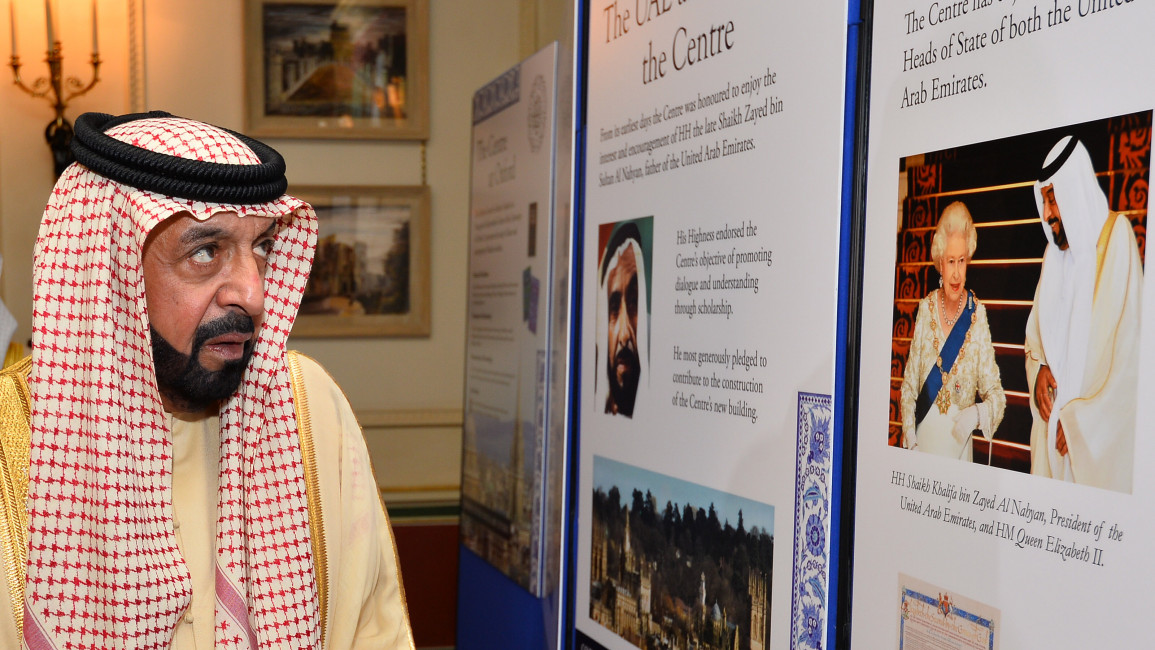Sheikh Khalifa bin Zayed oversaw UAE's economic boom, human rights bust
UAE President Sheikh Khalifa bin Zayed Al-Nahyan died on Friday at the age of 73, state news agency WAM said, citing the ministry of presidential affairs.
The UAE has declared a 40-day mourning period for its second-ever president, who was also emir of Abu Dhabi and supreme commander of the Emirati army. He was the father of eight children.
Born in 1948, Sheikh Khalifa became an official aged 18, appointed representative of the Eastern Region by his father Sheikh Zayed bin Sultan Al-Nahyan, who was then the ruler of Abu Dhabi and would go on to found the UAE in 1971.
Sheikh Khalifa became Crown Prince of Abu Dhabi in 1969, then deputy prime minister of the UAE in 1973, two years after the country was established. When his father died in 2004, Sheikh Khalifa replaced him as UAE president and Abu Dhabi's emir.
The new president built off of the lightning-fast development the UAE underwent during his father's rule, making the tiny Gulf state one of the richest in the world on the back of a boom in oil prices.
Yet the country also underwent a massive crackdown on all forms of dissent, effectively making it one of the Middle East's most brutal police states.
Sheikh Khalifa founded and ran the Abu Dhabi Investment Authority, a sovereign wealth fund that manages almost $700 billion. Little is known about how the fund operates.
In 2016, he was reported to have owned property worth more than $1.7 billion in London alone.
Since Sheikh Khalifa suffered a stroke in 2014, the UAE has in effect been ruled by his half-brother, Sheikh Mohammed bin Zayed, commonly known as MbZ.
MbZ, currently Crown Prince of Abu Dhabi, is Sheikh Khalifa's most likely successor.
During Sheikh Khalifa's rule - including the de facto rule of his brother - the UAE became an increasingly autocratic state, and human rights groups have slammed the Gulf state's rights track record, including the use of torture in its jails.
Following calls for democratic reforms during the 2011 Arab Spring, UAE authorities - led by Abu Dhabi - ordered a mass crackdown on pro-democracy activists known as the UAE-94.
Many of them still languish in jail without contact with other prisoners or the outside world.
Abu Dhabi has also become increasingly involved in bloody conflicts elsewhere in the Middle East, most notably in Yemen. It has assisted autocrats and warlords across the Middle East suppress pro-democracy movements since the 2011 Arab Spring, including in Egypt, Sudan, and Libya.
Arab state presidents chose to remember Sheikh Khalifa as a generous leader.
Iraqi President Barham Salih said Sheikh Khalifa was known for his "wisdom and generosity", while Egyptian President Abdel Fattah al-Sisi said he "gave a lot to his country and his nation".
The UAE normalised ties with Israel in 2020 through the US-brokered Abraham Accords, to the ire of Palestinians and some Arab and Muslim states. Many were angered at the UAE breaking ranks with pan-Arab consensus on the Israel-Palestine issue by normalising ties without a Palestinian state being established.
Bahrain, Morocco and Sudan followed the UAE and normalised ties with Israel shortly after.



